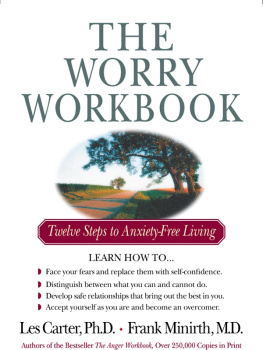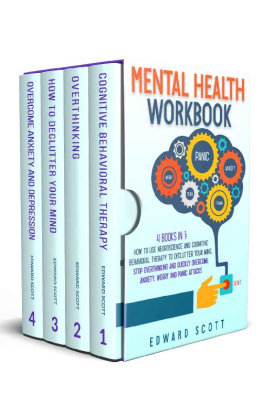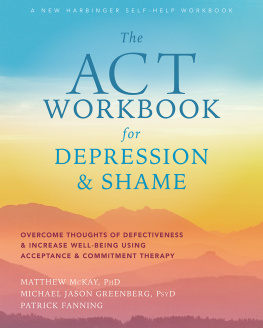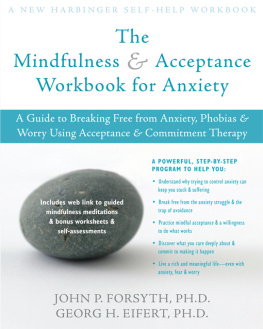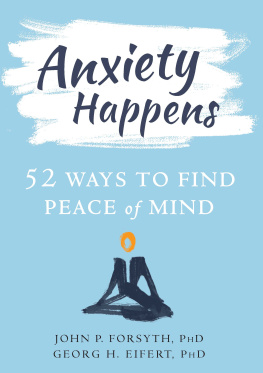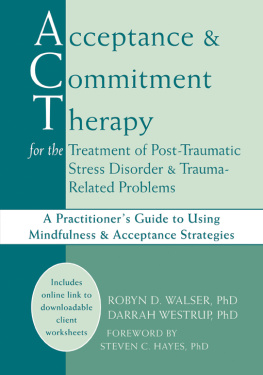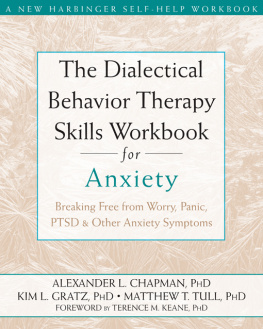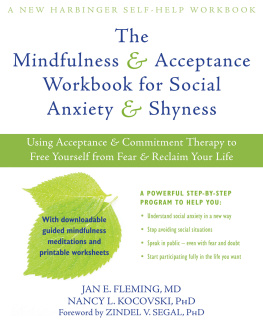Acceptance and Commitment Therapy (A.C.T.)
Workbook to Get Out From Anxiety, Relieve Depression, and Break Free From Stress and Worry, for a Newfound Mental Health
Gerald Paul Clifford
Copyright 2020 by Gerald Paul Clifford. All right reserved.
The work contained herein has been produced with the intent to provide relevant knowledge and information on the topic on the topic described in the title for entertainment purposes only. While the author has gone to every extent to furnish up to date and true information, no claims can be made as to its accuracy or validity as the author has made no claims to be an expert on this topic. Notwithstanding, the reader is asked to do their own research and consult any subject matter experts they deem necessary to ensure the quality and accuracy of the material presented herein.
This statement is legally binding as deemed by the Committee of Publishers Association and the American Bar Association for the territory of the United States. Other jurisdictions may apply their own legal statutes. Any reproduction, transmission, or copying of this material contained in this work without the express written consent of the copyright holder shall be deemed as a copyright violation as per the current legislation in force on the date of publishing and the subsequent time thereafter. All additional works derived from this material may be claimed by the holder of this copyright.
The data, depictions, events, descriptions, and all other information forthwith are considered to be true, fair, and accurate unless the work is expressly described as a work of fiction. Regardless of the nature of this work, the Publisher is exempt from any responsibility of actions taken by the reader in conjunction with this work. The Publisher acknowledges that the reader acts of their own accord and releases the author and Publisher of any responsibility for the observance of tips, advice, counsel, strategies, and techniques that may be offered in this volume.
Table of Contents
Introduction
Congratulations on purchasing Acceptance and Commitment Therapy (ACT)! This book was written to help you understand and accept yourself on a deeper level, so you can commit to transforming your life once and for all. Like everyone, you deserve to have everything you dream of in life, yet you cannot achieve that if you continually find yourself trapped with your past.
The value of acceptance and commitment therapy (ACT) is that it is a forward-focused therapy heavily pointed toward supporting you with creating peace with your past so you can empower yourself to enjoy a brighter future. At the foundation of ACT is the belief that we cannot change or pasts, nor can we control what will happen to us in the future. Accepting this means that we can choose to continue pursuing our dreams and living our desired lives regardless of what happens to us because we have the potential to choose where to focus and to focus on.
Throughout this book, you will be guided on a meaningful self-led journey toward discovering how you can come to peace with all that has ever happened in your life. You will also explore methods for genuinely accepting all that has happened, or will ever happen, so you are no longer repressing emotions, thoughts, or opinions. Instead, you will fully transform the way you feel about things so you can eliminate the power they hold over you and focus instead on what you desire to experience.
The greatest value of ACT is that it is not focused on denying, rejecting, or suppressing your past. It may seem unlikely now, but you will reach a genuine state of acceptance, which allows you to find peace around things that affected you in the past. As you reach this point, in your own timing, you will find it far easier to move beyond your past and start embracing your present and your future.
Aside from how thorough ACT is regarding your healing, it also provides you with phenomenal tools that enable you to embrace anything that may happen to you in the future, too. As you are likely aware, you cannot stop bad or hurtful things from happening to you, no matter how hard you try. Knowing how to accept this, and accept anything as it happens, allows you to become more resilient and flexible, thus allowing you to continually work toward achieving your dreams regardless of your experiences.
By the end of Acceptance and Commitment Therapy (ACT), your biggest takeaway will likely be this: regardless of what happens in your life, you deserve to experience greatness. You deserve to show up for yourself, enjoy all that life has to offer, and pursue anything you desire while feeling significant fulfillment within you. There is nothing on this earth that can stop you from achieving this state, so long as you are willing to deeply own that you deserve to experience greatness more than that which hurt you deserves to experience your downfall.
You are the one in control, even if you have forgotten that thus far. If you are ready to begin the journey of recovering your power over yourself and your life, its time to begin. Please, take your time and be gentle with yourself during this journey. If you approach the process of healing with a deep, profound sense of love for yourself, you will go much further. Good luck, and enjoy !
Chapter 1: The Theoretical Model of A.C.T.
ACT is a form of therapy that is based on the concept of relational frame theory (RFT.) This therapy model is based on the philosophy of radical behaviorism by B. F. Skinner, which implies that peoples behaviors are scientific in nature and can be affected by observable behaviors that we see in others. Aside from its connection to RFT and radical behaviorism, ACT is also associated with cognitive behavioral therapy or CBT. However, ACT does have fundamental differences from each of these similar therapies, particularly based on how it is implemented and what beliefs are associated with this particular therapy style.
The biggest difference between the ACT and any other form of therapy is that ACT follows a just observe perspective, while other modalities want you to uncover what has sparked the behavior that you are observing in the first place and how it can be changed. This seemingly passive experience allows you to rapidly move into a place of acceptance, then consciously decide how you will proceed based on what you genuinely want for yourself or from a given situation.
Relational Frame Theory (RFT) and Cognitive Behavioral Therapy (CBT)
RFT and CBT are two forms of therapy that are similar to the ACT. RFT is largely similar due to the fact that it is built around the same core therapy and belief system, while CBT is similar because it focuses on cognitive reframing.
RFT is best described as being a psychological theory of human language, which declares that the language you use defines what is actually going on within your mind. In other words, the action words you use when describing different things, or experiences, shine a light on how you genuinely feel about them, or how they are affecting you. This theory was defined by Steven C. Hayes, and he was from the University of Nevada in Reno and was expanded upon by Dermot Barnes-Holmes and his colleagues from Ghent University. The idea is that, by changing the way you describe things to yourself, you change the way you view them and therefore gain freedom from the pain they have been causing you.
CBT is often described as a psycho-social intervention therapy. Its main aim is to help people recover from a variety of different mental health conditions. This therapy seeks to identify problematic cycles a person experiences in their minds and restructure them, so they are no longer problematic. The idea is that we all have automatic behaviors, and the more we engage in these behaviors, the more automatic, or subconscious, they become. By bringing them into our awareness, we can shift our automatic behaviors, so we are no longer triggered to follow the thoughts, feelings, and behaviors associated with them, thus causing relief from negative patterns.




